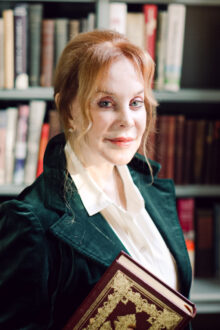
Melissa Pritchard on Flight of the Wild Swan
I have been interested in hospitals, medicine, and nursing for as long as I can remember. Being a candy striper volunteer at Stanford Hospital in high school is one of my happiest adolescent memories. I love the atmosphere of "angels among us," of people healing other people, observing the countless selfless acts of kindness that go on in hospitals. I once wanted to be a doctor but realized I didn't have the interest or aptitude in science I would need to be a pre-med student, so I gravitated, over time, toward the arts, specifically writing and acting. Later, I would recognize parallels between doctors and writers—both are diagnosticians, both study human behavior and the complex interactions of mind/emotion/body/spirit.
As I got older and traveled abroad, I would always visit medical museums if there were any nearby. The history of medicine in relationship to war has always interested me since some of the greatest medical discoveries have come from learning to treat war injuries, wounds often inflicted by the newest weapons of the time.
Not until my forties was I finally able to visit England. From the moment I arrived, it felt like returning to a place I had known long and well and still deeply loved. Not so much modern-day England, but what I could still find of the nineteenth, eighteenth, and earlier centuries in its museums, architecture, landscapes, and parks.
I sublimated this nostalgia, this strange homesickness, into my fiction. Selene of the Spirits is a novel about a nineteenth-century English medium. Palmerino is about a nineteenth-century English author who spent most of her life in Florence. A number of my short stories arise from researched and reimagined lives of nineteenth-century men and women. My first published short story was "Julka and Rena: A Simple Tale of Pre-Christian Poland," about a fourteenth century mother and daughter, herbalists, accused of witchcraft.
I had grown up hearing of Florence Nightingale—the iconic myth, the saintly legend—and have always been drawn to her story. When I was in London in 2013 and discovered there was a Nightingale museum, I couldn't wait to visit it. When I did, I was overcome by the knowledge I would write a novel about her and began a long period of research resulting in the fictionalized retelling of her life.
During this research, I came across the fact that Florence's mother had actually wondered aloud how a family of ducks, such as the Nightingales, could have hatched a "wild swan" like Florence. There—I saw it—was my perfect title. I wrote the first draft quickly, easily, in that delicious trance a writer can fall into when she has her subject. I subsisted on cookies and coffee, lived in the nineteenth century of my imagination. Years later, reading the final draft, I felt real joy and celebrated with champagne. Today I feel a great deal of excitement about Flight of the Wild Swan—more than I have with any other book I have written.
I find the creative alchemy of combining researched fact with imagination one of the most satisfying parts of writing fiction. To enter other worlds than the one I presently live in, to imagine and "become" other people in past times and places, is an enriching form of adventure, a way of understanding the specificities of history and the universality of human nature.
There are numerous variations and attributions to the saying, "When an old person dies, a library burns to the ground." When I write historical fiction, perhaps I am attempting to rebuild a life, a library, fact by fact, image by image, daydream by daydream.
Who was Florence Nightingale, the precocious child, the girl called by God, the despairing young woman, the desperately ill but determined nurse come home from the horrors—the utter waste—of war to what she believed was undeserved, distracting celebrity? This is what I have tried to sleuth out, and reveal to readers, in Flight of the Wild Swan.
Unless otherwise stated, this interview was conducted at the time the book was first published, and is reproduced with permission of the publisher. This interview may not be reproduced or reprinted without permission in writing from the copyright holder.
Your guide toexceptional books
BookBrowse seeks out and recommends the best in contemporary fiction and nonfiction—books that not only engage and entertain but also deepen our understanding of ourselves and the world around us.